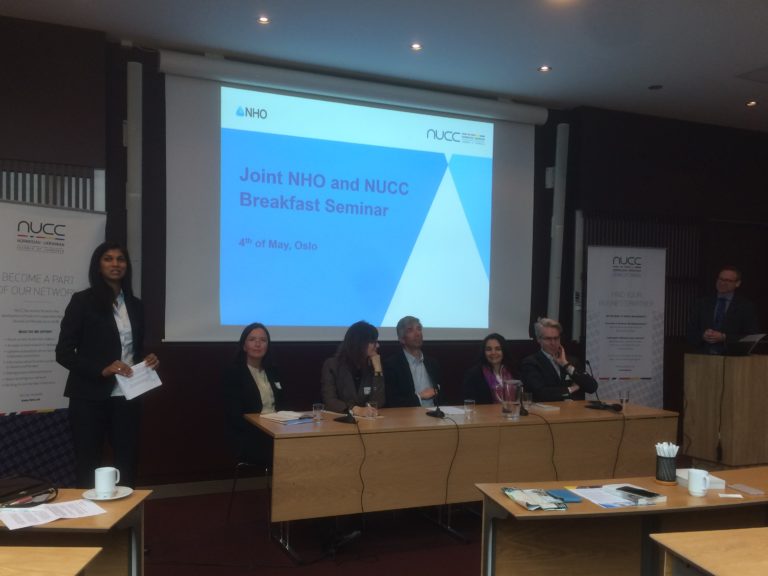
NHO & NUCC seminar: How to tackle CSR-risks in emerging markets?
With its highly-educated population, low cost levels and natural resources, Ukraine has a lot to offer Norwegian businesses. At the same time, as in many emerging markets, doing business in Ukraine involves challenges associated with CSR and corruption risks. How businesses can tackle these risks was the topic of the Norwegian Confederation of Enterprise (NHO) and the Norwegian-Ukrainian Chamber of Commerce‘s (NUCC) joint breakfast seminar 12th of May.
At the seminar, the results from a new study conducted by CSR Ukraine on how European, including Norwegian, businesses, assess the CSR risks associated with doing business in Ukraine and how they tackle these was presented.
The breakfast seminar was opened by Mr Tore Myhre, Head of International Department at NHO, and Laxmi Akkaraju, chair of NUCC.
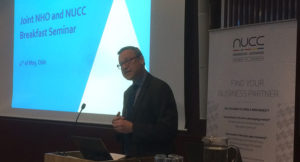
Tore Myhre, Head of International Department
at the Confederation of Norwegian Enterprise
Knowing the CSR challenges, and working to address them, is according to Mr Myhre, a way of maintaining a good reputation in an increasingly transparent world. Anti-corruption is a crucial part of CSR. Mr Myhre pointed out that companies headquartered in Norway must abide by Norwegian anti-corruption laws, as well as international anti-corruption conventions.
Ms Laxmi Akkaraju said that Ukraine, as one of Europe’s largest countries, with a highly-educated population, a low cost- level and rich on natural resources, has a lot to offer Norwegian enterprises searching for new business and investment opportunities. Ms Akkaraju underlined that NUCC as NHO expects its members to do business in an ethical fashion and have a policy of zero tolerance towards corruption.
Ms Dilek Ayhan, State Secretary in the Ministry of Trade, Industry and Fisheries, said that she is impressed by the process of implementing comprehensive reforms in Ukraine.
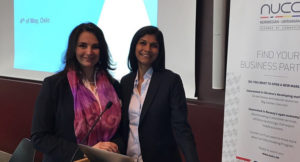
Tetyana Korotka, Deputy Business Ombudsman,
and Laxmi Akkaraju, Chair of NUCC
According to Ms Ayhan, you can feel the entrepreneurial spirit in the country. Norwegian companies tell us that corruption is one of the main challenges. Corruption leads to competition of bribes instead of price and quality. I do not believe that companies should stay away from these countries. They can lead to better business culture, but it is important to do proper risk assessment, said Ms Ayhan.
Ms Gro Skaaren-Fystro, special advisor in Transparency International Norway, talked about how Norwegian businesses should handle anti-corruption when going abroad. Her conclusion was summarized– pay no bribe. Skaaren-Fystro advised companies to have a good anti-corruption policy and be transparent. The anti-corruption programmes, should, according Skaaren-Fystro, be publicly available and be applied to agents and other intermediaries.
Ms Maryna Saprykina, CEO at CSR Ukraine, presented the results from a new CSR-study base on a survey among European, including and Norwegian, businesses on what they see at the main CSR risks andwhat strategies they have to tackle these. The study is a part of the project “CSR for Investors: Risks and Opportunities” supported by the Royal Norwegian Embassy in Ukraine. According to Ms Saprykina, CSR includes among others concern for the environment, human rights, employees rights and anti-corruption.
Ms Saprykina presented several recommendations based on her study: First, companies should be realistic about the market they are entering, but not be afraid of the risks. Second, companies should do their homework and assess the potential risks in the new market. Third, they should update their compliance policy if necessary and introduce efficient system for compliance policy and CSR.
And the last advice, enjoy what you are doing. You can read the whole report here.
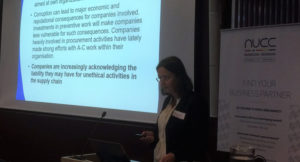
Gro Skaaren-Fystro, special advisor in
Transparency International Norway
Tetyana Korotka, Deputy Business Ombudsman, explained how the Business Ombudsman Council in Ukraine can support when businesses are facing trouble. The Business Ombudsman Council investigates complaints concerning alleged acts of corruption and other violations of legitimate interests of businesses by actions (or omission) conducted by public authorities or other businesses.
The seminar ended with a panel discussion, where addition to the speakers, representatives from Norwegian businesses talked about their experience from Ukraine, what they see as the main risks, how they have tackled these and what opportunities they see in Ukraine. Arne Mjøs, CEO and Founder of Itera, said that there are corruption challenges in Ukraine, but that he has not experienced these in his own business. The IT sector holds, according to Mr Mjøs, a high standard. Our major challenge is the perception about Ukraine, said Mr Mjøs.
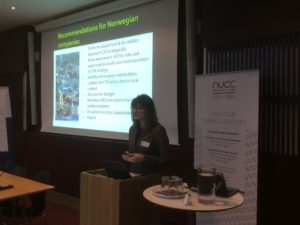
Maryna Saprykina,
CEO of CSR Ukraine
Christen Mordal, from CA Mordal Consulting, said that when it comes to import and export of goods they still face challenges associated with corruption. Mr Mordal has been working as a consultant to facilitate export of Norwegian seafood to Ukraine, among others. He said that there has been some development over time and that more international companies are coming in bringing with them more western way of doing business.
Mr Mordal’s advice to businesses is to do your homework and have a system to manage risks. A basic rule is to play by the book. You should also according to Mr Mordal secure your money and do not sell if you do not have possession. In case of trouble, Mr Mordal encouraged companies to contact the Business Ombudsman Council.
«There is a sense of urgency in transforming
our country into a modern and well-functioning
economy.»
Ms Skaaren-Fystro said that transparency in decision making can work as a preventing measure. Moreover, she adviced companies to have zero tolerance for corruption, but not zero discussion. Dilemmas and trade-offs should according to Ms Skaaren-Fystro be discussed with employees.
Ms Saprykina said that Nordic companies have high standard and can a positive signal.

Panel discussion whith the speakers, and representatives
from Norwegian businesses, Arne Mjøs, CEO of Itera, and
Christen A. Mordal, CEO of CA Mordal Consulting
Both Mr Mjøs and Mr Mordal are positive about the future. Mr Mjøs said that digitalization is an important tool to tackle corruption. Mr Mordal said that young people with new attitudes are now coming in positions. The free trade agreement between Ukraine and the European Union, which entered into force 1th of Janyary 2016, is according to Mr Mordal, the most important tool, which creates opportunities for Norwegian businesses.




